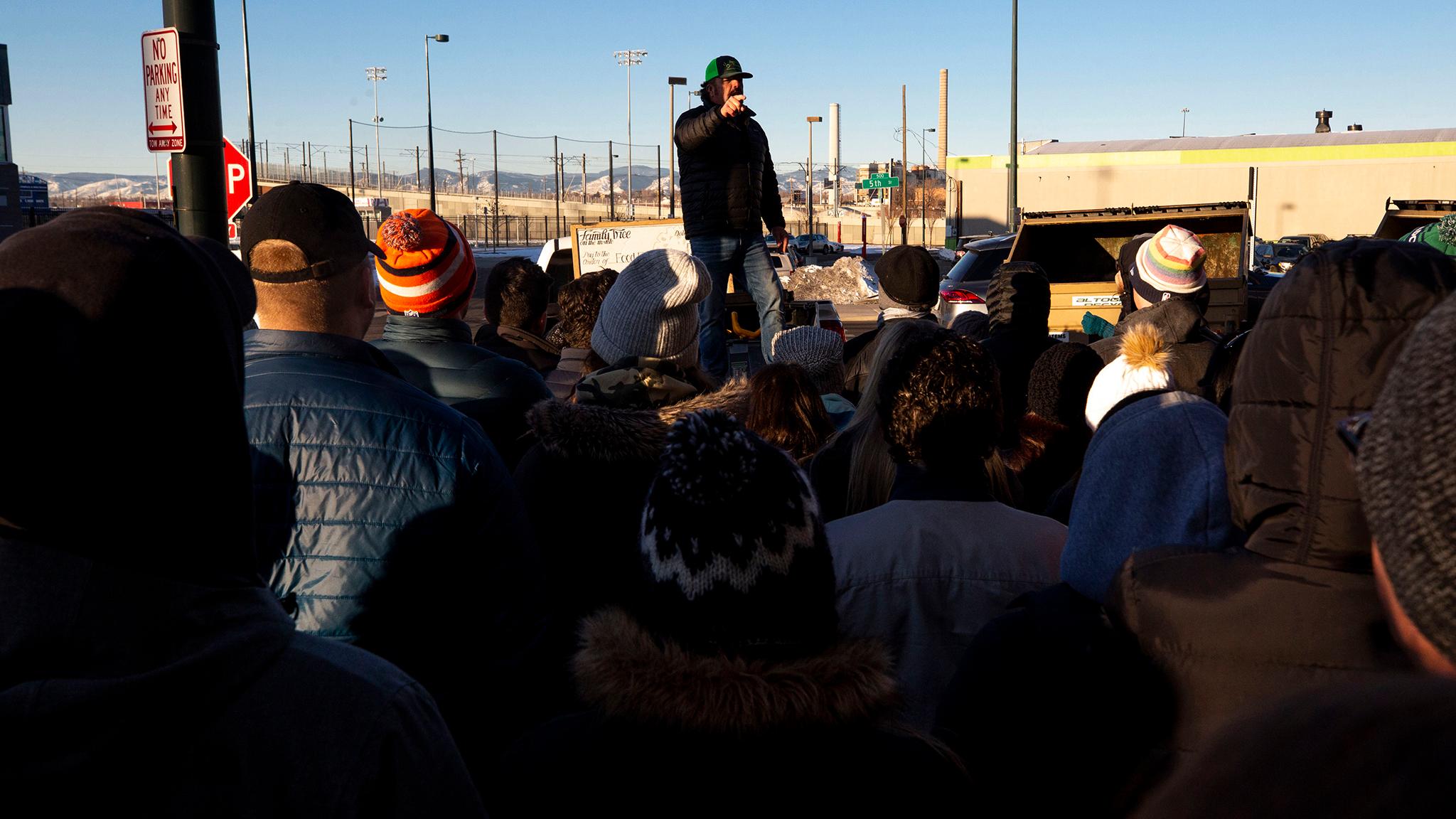It all started over drinks at My Brother's Bar.
As special-education teacher Tracy Towle remembers it, Bob Bell, a real estate agent she got to know at their neighborhood watering hole, often asked about the kids at her school, Columbian Elementary in Sunnyside. Somehow, they got on the subject of hunger.
"He really took it and ran with it," Towle said.
Bell and a friend, John Thielen, started sending some Columbina students home on Fridays with bags of food to ensure they did not go hungry over the weekends. That more informal project grew into Food for Thought Denver, a volunteer organization that serves 52 schools and thousands of students across the city and in Adams County. Food for Thought celebrated its eighth anniversary on St. Patrick's Day.
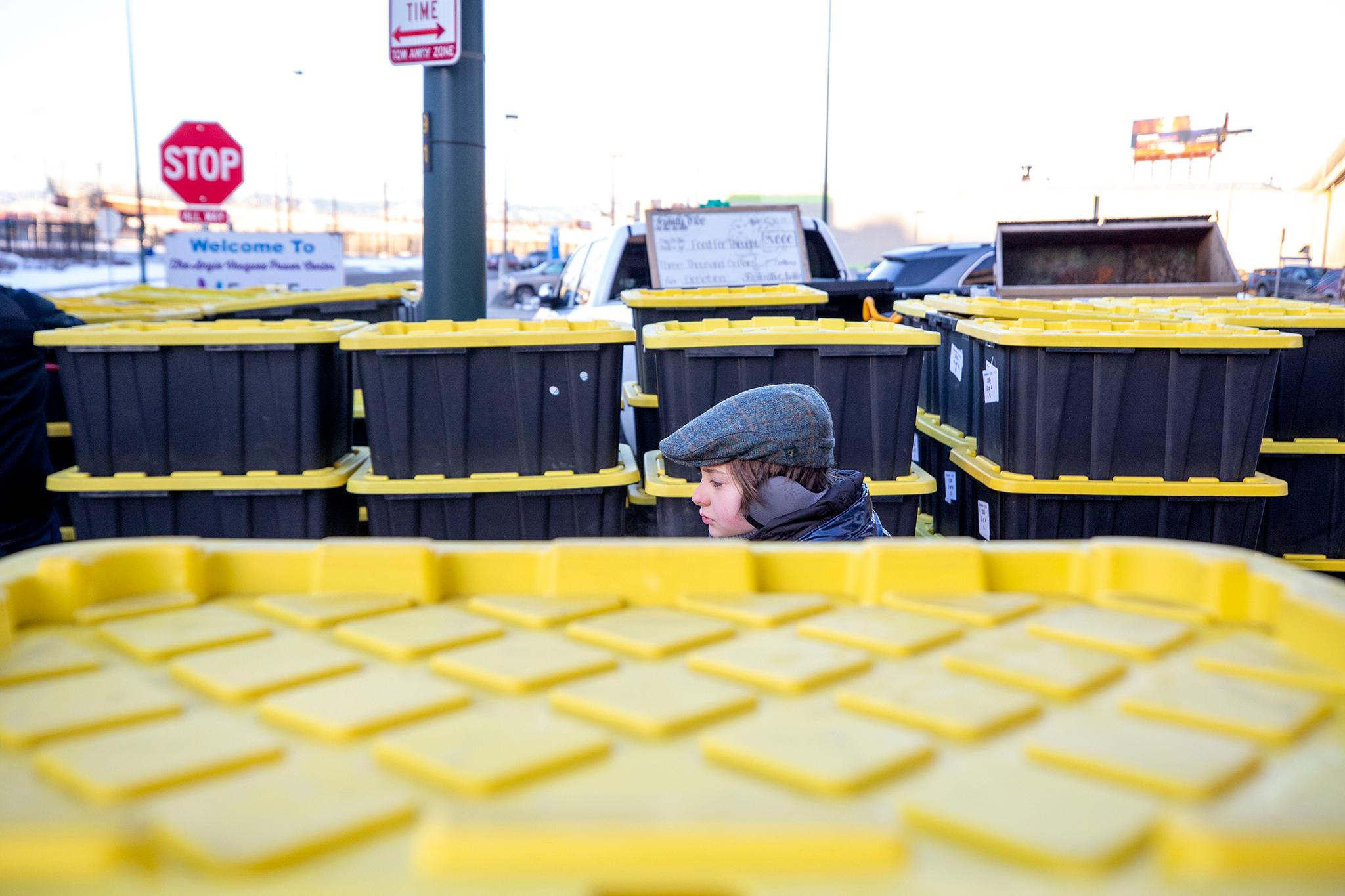
When Bell thinks back on his talks with Towle at My Brother's Bar, he recalls his initial disbelief that children in the neighborhood where he grew up were going hungry.
An estimated one in five Denver children are hungry or can't be sure of when they will next eat. Two-thirds of the more than 93,000 Denver Public Schools students are eligible for free or reduced lunches. Many who rely on school meals Monday through Friday can't count on eating regularly over the weekend.
When Denver schools closed starting Monday for three weeks due to the coronavirus outbreak, district officials took steps to ensure the extended spring break was not an extended period of food insecurity. DPS is offering free meals to students in need, including breakfast from 8 a.m. to 9 a.m. and lunch from noon to 1 p.m. at 12 schools: Abraham Lincoln High School and Valverde Elementary School in southwest Denver; Joe Shoemaker School and Place Bridge Academy in the southeast; Cowell Elementary School and North High School and STRIVE Prep - Sunnyside in the northwest; Bruce Randolph School and Denver Center for International Studies - Baker in central Denver; Manual High School in the northeast Denver; and Evie Dennis Campus and Montbello Campus in the far northeast.
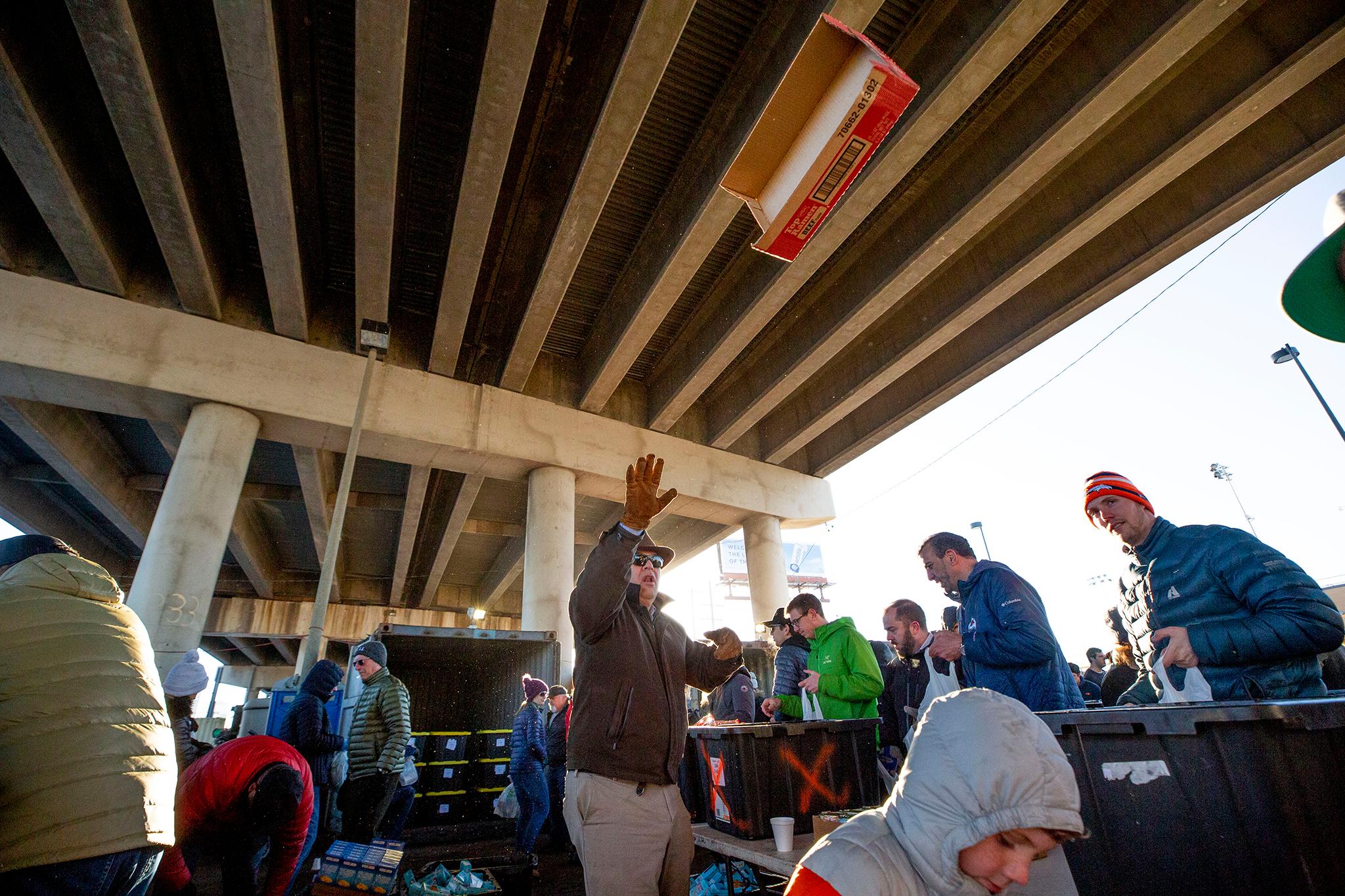
DPS is providing grab-and-go meals at the 12 sites Monday through Friday until classes and regular meal service resume in April. In a change to its usual program, Food for Thought Denver will be at those 12 schools this Friday to distribute bags filled with enough non-perishable food for a family of four for two days.
"We're just trying to get as close to the families as we can," Bell said.
He said Food for Thought Denver's plans after this week were not yet clear.
Bell had slots for 50 volunteers for Friday's packing. They filled up quickly. Volunteers will be instructed to keep a safe distance from one another and take other precautions because of coronavirus as they fill 3,500 bags. The 50 volunteers are about a quarter of his usual crew to fill 6,000 bags.
In the early days, Bell and Thielen worked with volunteers and their local Arvada Rotary club to raise funds. Now, donors send semis to the Food Bank of the Rockies to pick up supplies. Bell said almost all of his budget -- $1.2 million this year -- is used to buy food. No one draws a salary from the nonprofit.
Debbie Miller, who was the principal at Columbian when Food for Thought Colorado began, wanted to know what Bell's intentions were at the beginning.
"One of my first questions was, 'How do you pick the kids?"' Miller said.
Bell told her each of the 300 students in her school at the time would be served, so no one would have to be singled out and embarrassed.
"That's huge for me," she said.
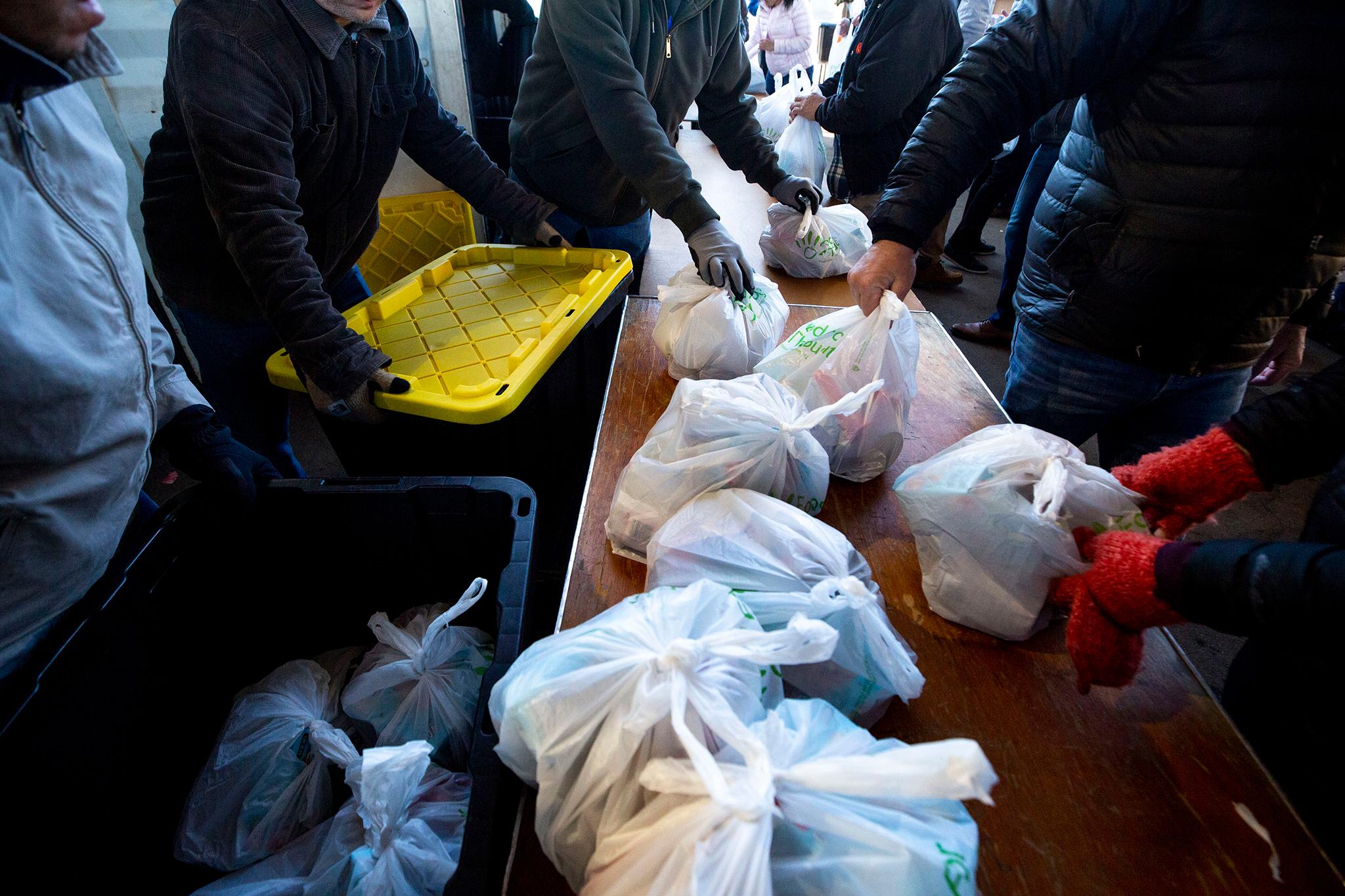
Miller had seen others with good intentions start such projects and then fade away. She pressed Bell on how long he would stick around, and he promised to be there as long as he was needed.
Columbian no longer needs supplies from Food for Thought Denver. Towle said families in the neighborhood have become more economically stable. Towle still attends Food for Thought Denver fundraisers and helps out in other ways. Miller, who retired from DPS five years ago, now serves on Bell's board.
Tom McGuire, who's known Bell for years, works for a German-style brewery that contributes beer to Food for Thought Denver's annual fundraising party. As often as possible, McGuire also joins 100 or so people who gather early Friday under the Colfax viaduct near Metropolitan State University's athletic fields. Food for Thought Denver has another packing site in Montbello and this year added a third in southwest Denver and a fourth in south Denver.
The volunteers are "a little fraternity of friends," McGuire said.
Christine Falcon said volunteering for Food for Thought Denver is a way to address "a hidden issue. You don't think people are starving in the city."
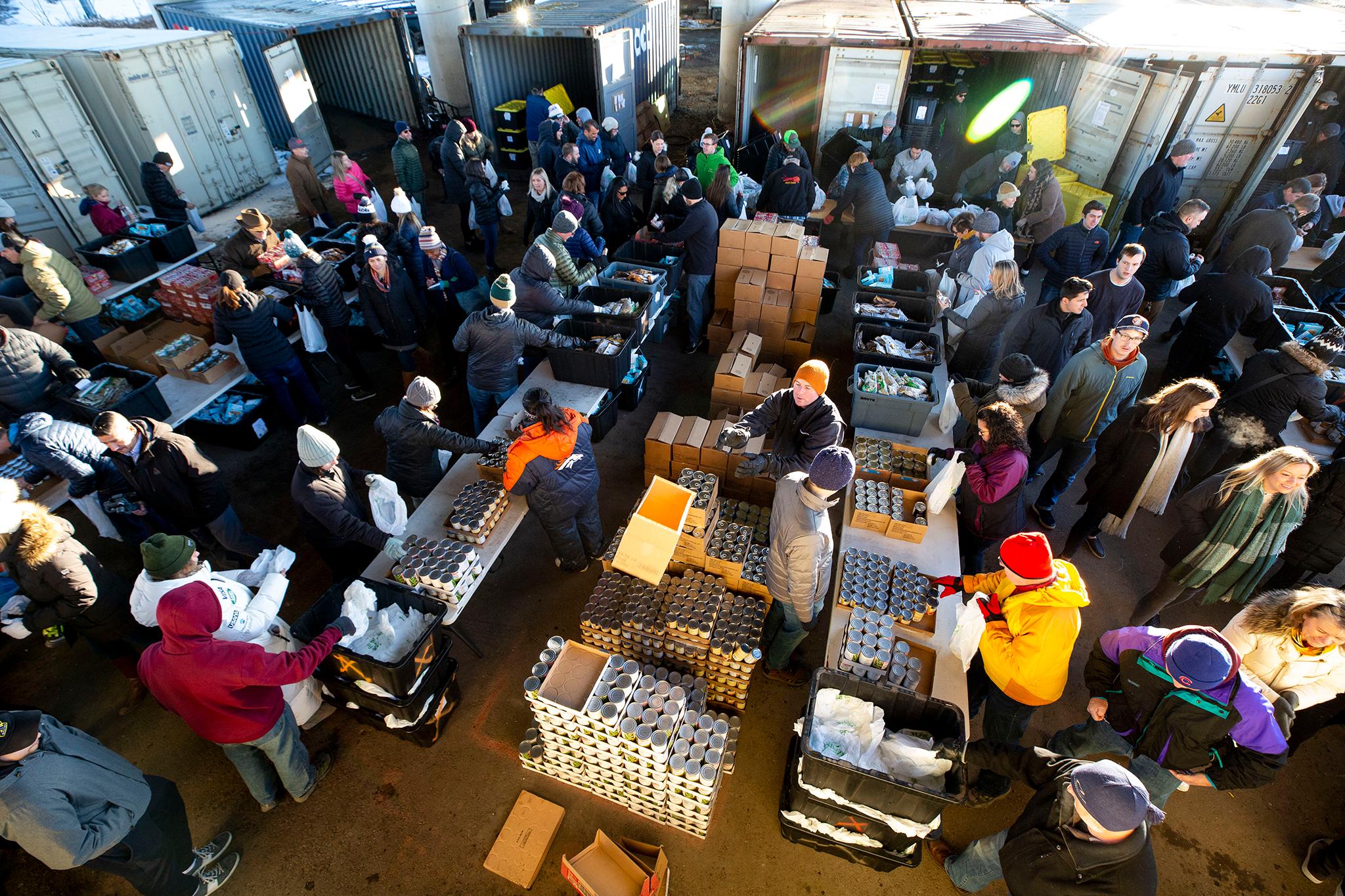
While the issue is serious, the atmosphere at the packing site is as convivial as a neighborhood bar. Bell, wearing a green and black baseball emblazoned with Food for Thought Denver's helping hand logo, greets volunteers with high fives and hugs.
Rich Aurand, who is retired from a career in the oil and gas field, has for the past three years been rising early every Friday to volunteer.
"No. 1, it's a great cause -- you're helping kids, you're helping families," said Aurand, who heard about the nonprofit from a friend. "And it's a lot of fun. And you get donuts and coffee."
A few minutes after 7 a.m., Bell climbs onto a truck bed to deliver a blunt pep talk.
"The fact that these guys are not eating in my backyard? In your backyard? Not acceptable," Bell tells the volunteers. "It sucks to have 52 schools full of kids that don't eat."
"You walked down here, you Ubered down here, because something pounds in here," he said, tapping his own chest over his heart.
Then everyone gets to work. Some are members of a set-up crew that had started arriving at 3:30 a.m. to fill tables with goods that include cans of green beans, tuna, and tomatoes, bags of lentils and pasta and packets of granola bars. The tables are arranged within a semi circle of shipping containers that are filled with plastic bins, each labelled with the name of a school and a classroom number.

The bags of food are passed to another group of volunteers who are filling and stacking the bins in the containers to be trucked out.
"You just sort of watch other people," Aurand said of how he was trained. "People will see something that needs to be done, and just do it.
The tables are cleared in less than an hour.
Leigh Clemente, a graduate student in CU Anshutz's psychiatry program, learned about Food for Thought Denver in January from an Instagram post on service opportunities and has been packing weekly ever since.
"It's an awesome way to start the day," she said.
And a loud way. Throughout the packing, a music mix chosen by Bell blasts from speakers over the rumble of cars and trains passing nearby.
In a playlist heavy on hard-driving 1980s and 1990s rock and pop, one song was more recent and seemed particularly apt, by Michael Franti & Spearhead:
"What if everybody had a job?
"And nobody had to break a law?
"What if everyone could say
"That it's good to be alive today?"

